Going green
Share
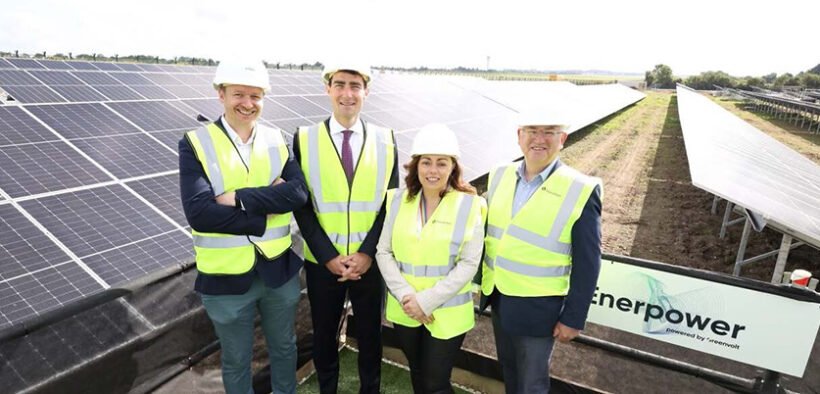
Airports across the globe continue to deliver on sustainability, achieving new milestones and pioneering new green initiatives, writes Joe Bates.
Dublin at the double – solar panels and thermal energy
Dublin Airport has revealed that it is exploring the potential of geothermal energy as a renewable, low-carbon energy source to heat and cool its facilities.
Geothermal energy comes from heat in the Earth’s core. While temperatures fluctuate above ground, a few feet below the Earth’s surface the ground remains at a relatively constant temperature.
Dublin Airport could potentially benefit from geothermal energy by using ground source heat pumps (GSHP) on-site at the Dublin Airport campus.
They use underground pipes to warm water that can then be used to help heat buildings and are a renewable, low-carbon energy source.
Other European airports using this type of technology include Copenhagen, Paris-Orly, Amsterdam Schiphol, Geneva, and Louisville and Vancouver International airports in North America.
High-level feasibility works to determine the viability of geothermal energy to meet Dublin Airport’s heating and cooling demands efficiently took place in 2022. These confirmed that the Dublin Airport campus is an effective geothermal resource suitable for a GSHP system.
Airport operator, daa, has now issued a selective tender for a comprehensive geothermal feasibility study and initial design for Dublin Airport.

The plan will explore the suitability of geothermal energy as a renewable alternative to heating and cooling many of its terminals and campus buildings by utilising a heating and cooling load between 7MW and 10MW through geothermal energy.
Andrea Carroll, daa’s group head of sustainability, commented: “We are excited to explore the potential of geothermal energy – known as the ‘heat beneath our feet’ – as a sustainable solution for heating and cooling at Dublin Airport.
“This initiative, along with our new solar farm which became operational in October, underscores our commitment to reducing our carbon footprint and advancing towards our goal of net zero carbon emissions by 2050.
“By integrating innovative renewable energy technologies, we are not only enhancing the sustainability of our operations but also setting a benchmark for other airports globally.”
The airport has been supported in its explorations by Geological Survey Ireland (GSI), a division of the Department of Climate Change, which promotes the uptake of geothermal as a renewable heating resource to reduce Ireland’s CO2 emissions.
Located within the grounds of Dublin Airport, the gateway’s newly commissioned 9MW solar farm will generate approximately 8,685,776 kilowatt-hours (kWh) of clean energy annually, equivalent to powering 1,600 homes for a year.
It will not only enhance Dublin Airport’s energy independence but also significantly reduce its carbon footprint, avoiding approximately 2,583 tonnes of CO2 emissions each year.
The solar installation – installed by Enerpower and powered by Greenvolt – comprises 15,000 high efficiency panels, which will provide 13% of the airport’s total electricity requirements, reducing
its reliance on grid electricity and supporting Ireland’s ambitious renewable energy targets.
By 2030, daa aims to reduce Dublin Airport’s direct (Scope 1 and 2) emissions by 51%, with this solar project playing a key role in achieving that target.
Speaking about daa’s sustainability goals earlier this year, chief commercial and development officer, Vincent Harrison, said: “Ireland is a small, open island economy and aviation has been an essential engine of our economic growth and prosperity for more than 80 years.
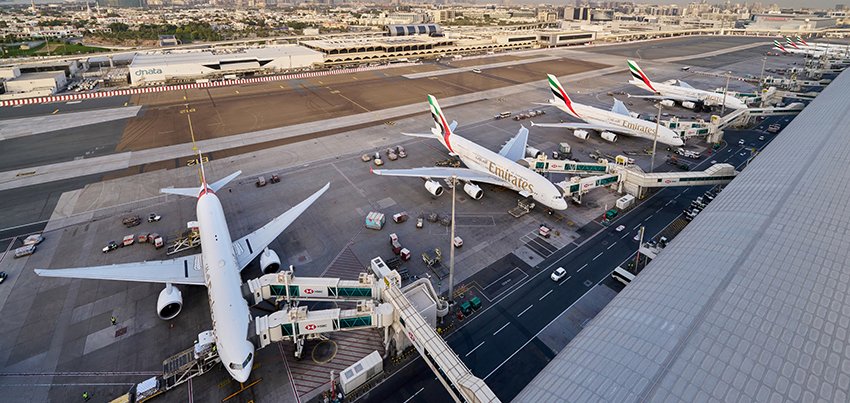
“The challenge now is to transform into a zero-carbon industry as quickly as possible, while continuing to meet our mandate to support Ireland’s connectivity needs.
“While the aviation industry doesn’t have all the answers yet, daa is committed to halving the emissions under its direct control. We have allocated €400 million to innovative sustainability initiatives and look forward to announcing more ambitious projects.”
DXB continues to raise the sustainability bar
Dubai International Airport (DXB) has achieved Level 4 ‘Transformation’ status in ACI’s Airport Carbon Accreditation programme.
The UAE hub notes that the achievement recognises its efforts to cut carbon emissions and places it among the top 5% of the world’s participating in the programme.
‘Transformation’ certification is awarded to airports that realise absolute emissions reductions and drive systemic change with its stakeholders.
The airport has no doubt that its commitment to minimising its environmental impact and enhancing operational efficiency – with a comprehensive focus on decarbonisation, resource conservation, and the adoption of cutting-edge technologies – will play a key role in supporting the UAE’s Net Zero 2050 strategy.
“Achieving Level 4 ‘Transformation’ accreditation underscores our firm commitment to embedding sustainability at the core of everything we do at Dubai Airports,” enthuses Dubai Airports CEO, Paul Griffiths.
“This recognition not only highlights our progress in reducing our own carbon footprint but also reflects the strength of our partnerships in driving broader, systemic change across the aviation ecosystem.
“For us, sustainability is not a checkbox – it’s a long-term strategy that involves collaboration, innovation, and constant improvement.

“The responsibility we own goes beyond our operation; it’s about leading by example and embracing a culture where every stakeholder plays a part in creating a more sustainable future. Together, we are setting a new standard for what is possible in airport operations, as we continue to support Dubai’s and the UAE’s leadership in the global effort towards Net Zero by 2050.”
Stefano Baronci, director general of ACI Asia-Pacific & Middle East, said: “We congratulate Dubai Airports for its significant strides in reducing carbon emissions, setting a benchmark for airports across the region.
“By positioning itself as one of the leaders in efficient carbon management, Dubai Airports demonstrates a strong commitment to building a more sustainable future. Dubai Airports’ approach aligns with our industry’s collective vision of achieving net zero emissions by 2050.”
DXB has made significant progress through key initiatives and partnerships aimed at advancing sustainable aviation.
For example, a recent collaboration with dnata and Emirates National Oil Company (ENOC) is designed to transition dnata’s non-electric airside fleet to a biodiesel blend, reducing carbon emissions by over 3,500 tonnes annually.
Other initiatives include a partnership with Etihad Energy Services to enhance energy efficiency through a building and lighting retrofit and solar integration, and a collaboration with BEEAH Group, reducing landfill waste by 60% through an innovative food waste treatment plan.
On the airfield, DXB’s adoption of the ‘Follow the Greens’ system has also optimised aircraft taxiing, cutting fuel consumption and emissions.
While other successful initiatives include active engagement with ‘Airports of Tomorrow’, a collaborative venture by the World Economic Forum (WEF) and ACI to steer the aviation industry toward net-zero carbon emissions by 2050.
And the newly launched oneDXB Sustainability Alliance, a network of airport partners, is further driving sustainability by exploring over 180 additional potential decarbonisation projects.

Free public EV charging at Belgrade Nikola Tesla Airport
Globos Osiguranje has sponsored five EV ARC solar-powered EV charging stations at Belgrade Nikola Tesla Airport, Serbia’s busiest international travel hub, and will provide free public electric vehicle (EV) charging.
Since the systems operate off-grid, they support the airport’s sustainability efforts while also setting a new standard for energy-efficient solutions at major travel hubs.
Beam Global is behind the initiative, and will generate income through a long-term annuity stream with recurring payments.
“We are proud to make Belgrade Airport the first airport in the world to offer free, standalone, 100% solar-powered EV charging,” said airport CEO, Chivoine Rem.
“Our commitment to minimising our carbon footprint aligns with VINCI Airports’ global policy, which aims for zero CO2 emissions by 2050.
“To optimise energy consumption and to reduce CO2 emissions, we employ a range of strategies – we are already producing the energy from our solar power plant for couple of years and besides previously installed chargers at Tesla parking, we are offer our customers solar-powered EV chargers across the airport site.
“These initiatives make Belgrade Airport unique in Serbia. Filling their EVs with renewable energy while they are here is an excellent example of the benefits that we are working to create. The partnership with Beam Global means that we are constantly able to offer more comfort to our travellers.”

Sustainable asphalt based on cashew nuts tested at Frankfurt
Fraport AG is exploring new, innovative approaches for the use of construction materials.
Together with the startup B2Square – Bitumen Beyond Oil – the airport operator is using sustainable asphalt concrete to build and test a 200-metre-long section of road located on the airport apron.
This is the first time that organic cashew-based bitumen has been used at an airport anywhere in the world.
Bitumen is indispensable for road construction. It is normally obtained as a byproduct when distilling crude oil and then mixed with mineral aggregate to make asphalt concrete (also known as blacktop) for building roads.
In this case, however, B2Square is blending naturally occurring hydrocarbon resin with an organic extract obtained by pressing cashew shells.
The resulting material is then mixed with aggregate to make sustainable asphalt. According to the airport, this biogenic raw material is much more durable and climate-friendly than conventional asphalt concrete.
Like all plants, cashew trees extract carbon dioxide from the atmosphere. The CO2 stored in cashew shells is neutralsed in a special process and then permanently bound in road pavement. The low-temperature method used to lay it additionally improves the climate balance by consuming less energy.
“We regard this innovative bioasphalt based on organic bitumen as a fascinating possibility for reducing Frankfurt Airport’s carbon footprint,” says Andreas Eibensteiner of Fraport AG’s Environmental Management Department.
“To effectively combat climate change, you have to think out of the box and try out ingenious approaches like this one.”
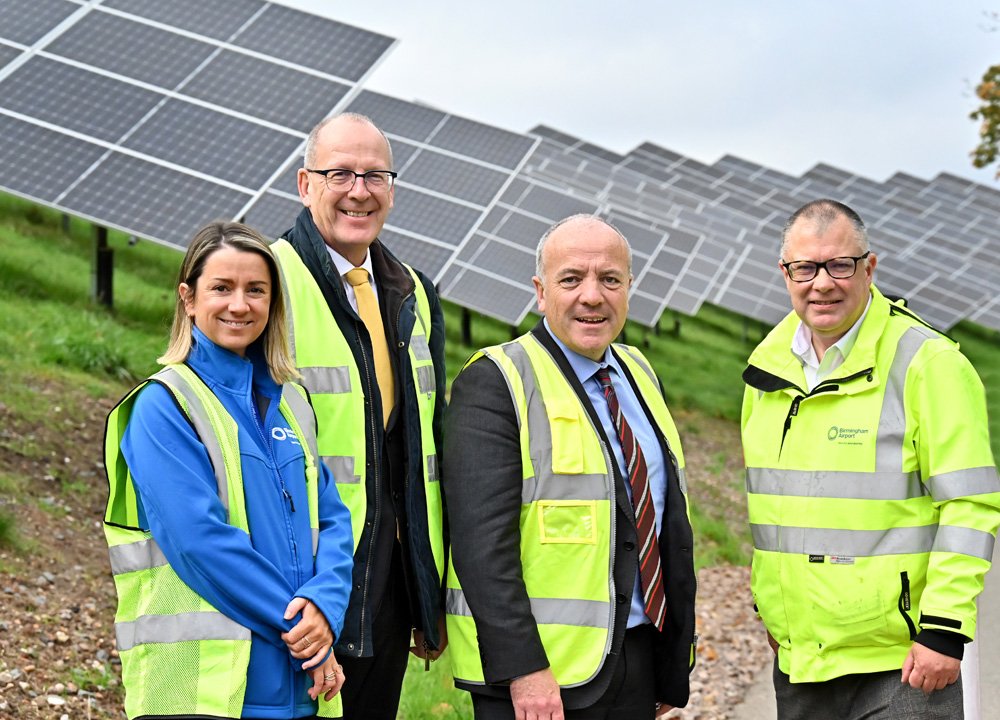
Stewart@stewartwrittle.co.uk.
UK Aviation Minister visits BHX’s new solar farm
The UK’s Aviation Minister, Mike Kane, has visited Birmingham Airport’s new 6.8-megawatt solar farm, made up of 12,000 panels, responsible for providing at least 20% of the airport’s electrical power requirement.
Birmingham Airport (BHX) has committed to beat the government’s deadline and become net zero by 2033. An ambitious target that the multi-million-pound sustainable investment will contribute to as it is less reliant on the Grid.
Evo Energy worked closely with the airport on the design and build plans with works commencing on the solar panel site last year at a cost of £9.7 million.
With full plant usage today, these panels, at peak, will supply 6.8MW of power back to the airport, and it is anticipated it will save 1,285 tonnes of CO2 per year.
Airport CEO, Nick Barton, noted: “Our solar panels will ensure that at certain times of the year, during sunnier and warmer days, we will have no reliance on incoming power sources, key to our net zero target.”
Evo Energy worked closely with the airport on the design and build plans with works commencing on the solar panel site last year at a cost of £9.7 million.
Aviation, Maritime and Security Minister, Kane, said: “It’s fantastic to see Birmingham Airport embrace our 2033 net zero mission.
“Their new solar farm, built with millions of pounds of investment, will produce almost a quarter of the electricity the airport needs over the coming years.
“It’s this sort of innovation and drive that will help the UK become a Clean Energy Superpower, and we will continue to support industry to achieve that goal.”
BHX is gearing up for sustainable growth and over the next decade and will invest over £300 million in terminal and airfield infrastructure, alongside initiatives that will deliver sustainable growth.
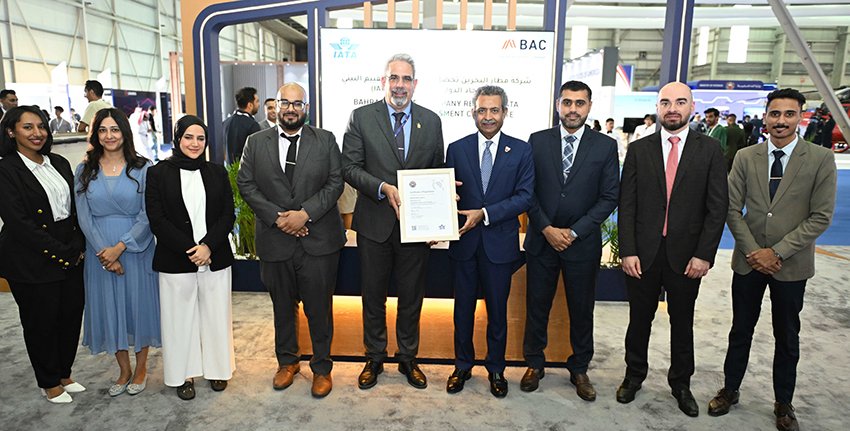
Bahrain becomes first airport to receive IATA environmental assessment certification
Bahrain International Airport has become the first airport in the world to attain IATA Environmental Assessment (IEnvA) certification.
Operator, Bahrain Airport Company (BAC), believes that the achievement highlights the airport’s innovative approach to environmental sustainability and responsible operations.
BAC CEO, Mohamed Al Binfalah, stated: “Achieving the world’s first IEnvA airport certification is a remarkable milestone, reflecting BAC’s strategic dedication to minimising the airport environmental footprint.
“This achievement is a direct result of the hard work and dedication of the entire airport community, who have embraced our strategic objective. By minimising our environmental impact, we not only enhance our own performance but also contribute to a more sustainable future for the entire aviation industry.”
Kamil Alawadhi, IATA’s regional vice president for Africa and the Middle East, noted: “This is a remarkable achievement that reflects their unwavering dedication to environmental sustainability and responsible business practices through robust environmental management plans with continual performance improvements.
“I commend the efforts of everyone involved and wish Bahrain Airport continued success in improving their sustainability performance.”
Established by IATA over a decade ago, the IEnvA programme has been instrumental in enhancing the environmental performance of airlines and was expanded to encompass airports and ground handling companies in July 2022.
BAC enrolled in the programme in February 2023. The rigorous certification process involved five stages, including comprehensive gap analyses and on-site assessments conducted by IATA experts.
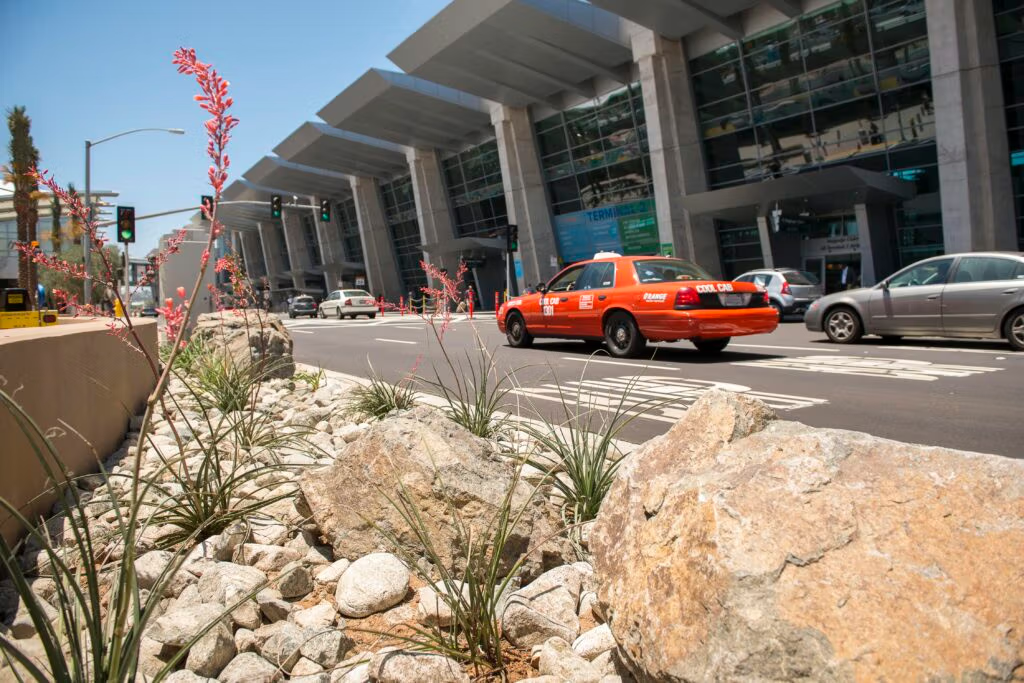
San Diego releases new ESG report
The San Diego County Regional Airport Authority has released its 2023 Environmental, Social & Governance (ESG) Report, which can be viewed and downloaded at san.org/ESG.
The report serves as a barometer for San Diego International Airport’s relationship with the greater San Diego community through its environmental stewardship, social responsibility and responsible governance.
Since 2011, the airport authority has published an annual sustainability report, and for the 2022 report, began incorporating Diversity, Equity and Inclusion goals.
With the 2023 ESG report, the airport notes that it is embracing efforts by the airport industry to coalesce around a common reporting framework.
“As we transition to ESG reporting, we are excited to shine a light on the exciting projects and initiatives that drive San Diego International Airport forward,” said Kimberly Becker, president and CEO of San Diego County Regional airport authority.
“We’re focused on creating a sustainable future by reducing our carbon footprint and being a responsive community partner, while continuing work on the New Terminal 1, which is scheduled to open next fall.”
The Airport Authority will provide bi-annual ESG reports moving forward, while continuing to report on ESG data and trends annually.

Airports of Thailand unveils green management plan
Thai airport operator, Airports of Thailand (AOT), has ambitions to transform Chiang Mai, Mae Fah Luang, Phuket, Hat Yai and Bangkok’s Suvarnabhumi and Don Mueang airports into ‘green’ gateways.
The six international airports currently account for 95% of all air traffic across Thailand.
According to AOT’s chief advisor for engineering and construction, Jakkraphob Jarassri, the new green strategy focuses on four main pillars – connectivity, system integration, sustainability and airport size.
From the sustainability perspective, the focus is on fostering an eco-friendly airport environment in co-operation with local communities, aimed at reducing the long-term environmental impact
of airport activities.
Jarassri, speaking at a recent sustainability conference in Bangkok, said: “As for airport size, we realised that large airports are not always necessary, and will try to keep these suitable for users’ needs while still maintaining efficiency and convenience.”
In support of Thailand’s bid to reduce carbon emissions from the transport sector, AOT routinely monitors energy consumption at its airports.
“We try to reduce energy usage to minimise greenhouse gas emissions as much as possible,” added Jarassri. “AOT also plans to purchase carbon credits in the future to offset the portion of emissions that we cannot reduce.”
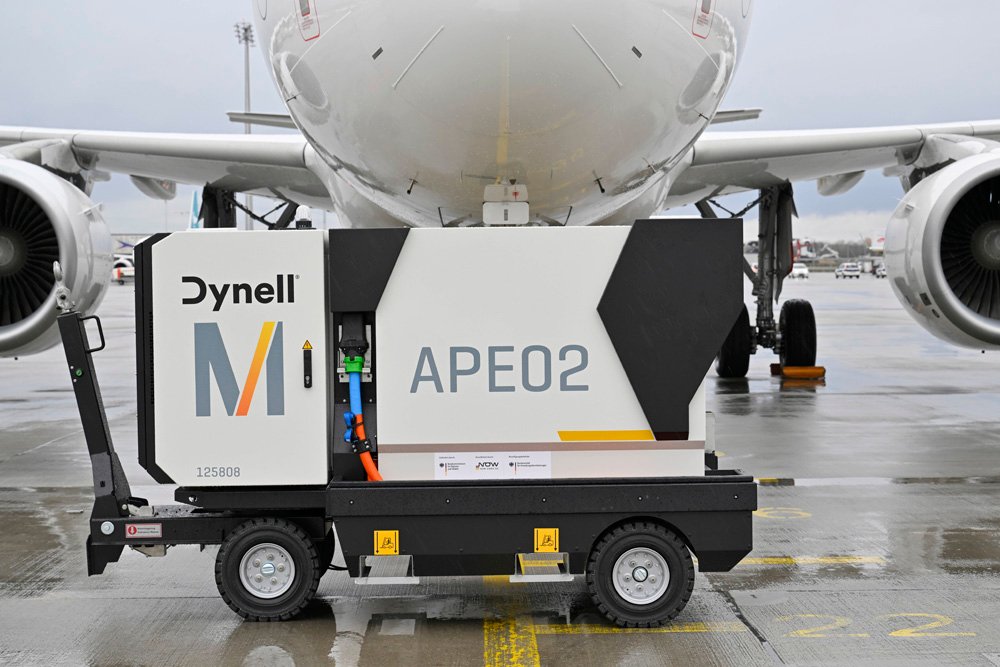
Munich Airport switching to electric ground power units
Munich Airport has introduced the first of 20 electric ground power units (eGPUs) set to be in place by the end of the year as part of its ambitious Net Zero 2035 sustainability programme.
The switch to eGPUs on the apron by AeroGround, a wholly owned subsidiary of Munich Airport, means that two thirds of the ground power units the gateway are now powered by electricity, which is expected to save around 8,000 tons of CO2 emissions annually.
The cost of the environmentally friendly power generators was part funded by a €5.6 million grant from the Federal Ministry for Digital and Transport.

LEED gold certification for Hamad’s ORCHARD
Hamad International Airport’s Central Concourse, which includes the indoor tropical garden, ORCHARD, has received Leadership in Energy and Environmental Design (LEED) Gold Certification.
The certification showcases the airport’s commitment to sustainability and environmentally responsible construction practices.
LEED certification is a globally recognised symbol of sustainability achievement and one of the most widely used green building rating systems.
Certifications are awarded to buildings that meet rigorous environmental standards across various parameters, including energy efficiency, water usage, air quality, and material selection.
Attaining the LEED Gold certification symbolises Hamad International Airport’s dedication to integrating the highest environmental standards into its operations, ensuring long-term efficiency, cost savings, and a positive environmental impact.
The Central Concourse, where ORCHARD is located, was part of Phase A of Hamad International Airport’s expansion plan and was designed to utilise 30% less energy and 55% less overall water usage.
Through its commitment to advancing sustainable best practices the central concourse at Hamad International Airport joins a relatively limited number of airport terminals worldwide which have achieved similar certifications from LEED.
MATAR, the Qatar Company responsible for operating and managing the gateway, believes that LEED Certificate stands as a testament to Hamad International Airport’s ongoing commitment to reducing emissions and addressing climate change through continuous enhancements to the facility’s environmental performance.
In its sustained effort to promote sustainability, the airport is spearheading innovative initiatives aimed at minimising waste and maximising resource efficiency, further highlighting its dedication to environmental responsibility.
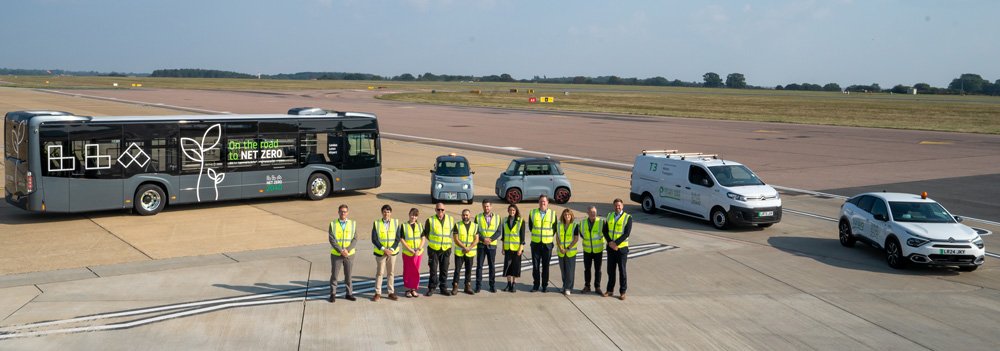
London Luton invests in new sustainable bus fleet
London Luton Airport (LLA) notes that it has taken another key step in its journey to achieving net zero emissions by 2040 following its investment in a fleet of sustainable car park transfer buses and operational vehicles used across the airport.
The new buses are powered by ISCC (International Sustainability Carbon Certification) certified hydrotreated vegetable oil (HVO), a lower-carbon alternative to diesel that can save up to 90% of carbon emissions across the fuel’s lifecycle.
The investment in the buses, alongside the transition of all airside operations vehicles to HVO and an increase in the number of electric vehicles (EV), means that almost two thirds of LLA’s operational fleet will be electric or running on low-carbon fuel by the end of 2024.
The UK gateway’s head of sustainability, David Vazquez, said: “As part of our commitment to net zero, we have set targets to implement a 100% low-carbon fleet by 2030. From the end of this year, this latest transition, will reduce our airport emissions by nearly 15%, playing an important role in our plans for responsible growth.
“All aspects of our sustainability strategy are underpinned by collaboration and I’m grateful to teams across the business, who work so hard to embed better environmental and social practices into their daily roles and responsibilities.”
LLA’s trajectory to net zero focuses on six key areas that will see the airport working with partners and the wider industry to implement various decarbonisation initiatives.
These include developing on-site renewables, phasing out natural gas, improving energy efficiency, and transitioning its operational fleet to low carbon alternatives.







